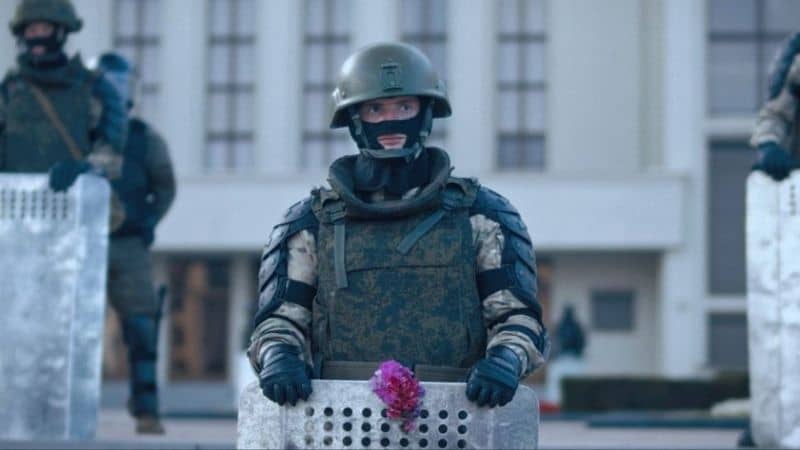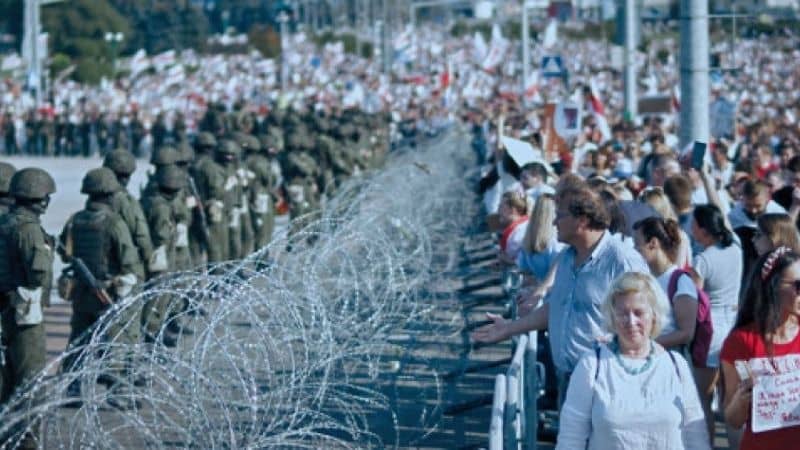There is something very prosaic and passive about the way young Belarusian director Aliaksei Paluyan opens his curiously gentle documentary Courage about the current wave of protests against Alexander Lukashenko, the brutal dictator who has run Belarus for the past 26 years.
Archive footage from protests staged two decades ago positions this as a documentary with a broader, longer-term view than just recounting the explosive events since August 9, 2020, when disputed (largely agreed to be rigged) elections handed Lukashenko another term in power.

A shift to tyranny
The turmoil of last August – when opposition leaders were arrested or, like Sviatlana Tsikhanouskaya, driven into exile – has abated, the international news crews moved on, and protest turned to smaller, more symbolic – but still regular – actions. Only in early February, two young journalists working for Polish-based TV channel Belsat were imprisoned for live streaming last summer’s protests. That Lukashenko’s long-running dictatorship has shifted into tyranny – imprisoning journalists for simply doing their jobs, not to mention the deaths of several protestors last year – is the discrete undertow to Paluyan’s film.
This is not a documentary that is strong on historical or even current political context. It is enough to know that these (mostly) young Europeans live in a police state where your life can be forfeit at the snap of the fingers from a sinister and well-armed regime.
It is enough to know that these (mostly) young Europeans live in a police state
But the very fact that Belarus sits to the west of Russia and has long been viewed by the Kremlin as a buffer state against NATO and the European Union, helps explain the failure of mass protests that brought hundreds of thousands of ordinary people out onto the streets of Minsk, Gomel, Brest and other towns across Belarus last summer. Lukashenko has never got on very well with Russian president Vladimir Putin – playing push and shove games to obtain cheap oil but avoiding overtures to reunite with his bigger neighbour – but political expediency on both sides drove Lukashenko to seek Russian security guarantees that effectively strengthened his hand during last summer’s protests. Moscow does not want a colour (the protestors in Belarus rally under the old pre-Soviet red and white flag) revolution in his own backyard.
Even without this level of knowledge or context, Courage works at the level of a film showing how ordinary people respond to extraordinary circumstances.

Belarus Free Theatre
Our heroes are all in their 30s or 40s and members of the Belarus Free Theatre – set up as an opposition activity by members of the Minsk State Theatre 15 years ago. Whether they are dedicated to their art (like Maryna Yakubovich and Pavel Haradnizky) or the more cynical Denis Tarasenka, now working as a motor mechanic and blacklisted from appearing in films (the vast majority of which in Belarus are state-funded), our protagonists are struggling with choices forced on them.
For those with young children – or planning families – the key question is do they stay and fight, risking arrest or worse; or flee and become part of the increasing Belarusian diaspora in exile (like Nicolai Khalezin and Natalia Kaliada, who direct performances in Minsk via Skype from London).
By setting the scene with visions of ordinary domestic life in the parquet-floored apartments of Minsk, the director creates a connection with viewers whose lives – and homes – are likely not so different from these young Belarusians.
The theatre members prepare for the elections and enjoy brief elation when a local precinct reports a majority for the opposition candidate on the night of August 9 (the truth is that many precincts likely returned majorities for Tsikhanouskaya, but ballot box stuffing and simple fraud handed Lukashenko a massive «victory»).
As the scale of the electoral fraud becomes evident, Minks erupts in mass protest, brutally suppressed by riot police, and thousands are arrested.
Carefully executed in three acts, like any classic tale, Paluyan sets the stage for the second around the 30-minute mark, when Denis has a chat with his boss, a former OMON officer and Afghan War veteran. Viewers without detailed knowledge of Soviet history may not appreciate that being an Afghan War veteran not only gives this man special status but also suggests independence of spirit and attitude that means he is by no means a friend of the regime.
As the scale of the electoral fraud becomes evident, Minks erupts in mass protest, brutally suppressed by riot police, and thousands are arrested.
He’s old now (at 55) and tells Denis he won’t participate in the protests, but he is hearing bad things from his old comrades in arms: «Nothing good… They are on the verge of opening fire on the protestors, » he says before turning and spitting into the dust. He adds that if things get really rough, protestors can rely upon Afghan veterans for support and, for his part if it came to it, he would «fight for his country, not for Lukashenko.»
The problem, as Paluyan’s attentive camera shows, is that all the rank-and-file riot police and OMON (special riot police) officers tackling the protests are young. Some of them engage in conversation with protestors, albeit stating they are not authorised to comment. Others look uneasily into the camera. Paluyan invites us to see the self-disgust they feel. It is almost as if deep down they know they are scum and feel the opprobrium the protestors heap upon them with shouts of pozor! (shame). Perhaps this helps explain the violence of their lashing out when they clash with protestors – as if to try to push their self-loathing away.
Meanwhile, as Maryna and Pavel participate in the protests, or join families looking for their loved ones at detention centres around Minsk, they also lay contingency plans for fleeing if they have to («London or Kiev?» Pavel asks his girlfriend), and agree to secret plans for how they would achieve this: «Put Signal on your phone and memorise my number by heart,» an unseen interlocutor tells Pavel via Skype.
The final act?
Paluyan pulls things together in the final act where he looks at the context within which today’s protests exist, recalling the ordered killings of two kidnapped politicians 20 years ago (the Free Theatre restages Discover Love, a play based upon this story with the widow of one of the men, introducing it via Skype), and the sense in which the long story of repression in Belarus is driving towards some kind of eventual conclusion.
«It is no longer a question of whether Lukashenko is a dictator or not; without a dictatorship, the theatre would have other issues anyway… no, now it is a question of tyranny. It is pure tyranny,» Pavel muses, adding: «It is no longer a question of theatre, of saying things between the lines – we need to go out directly and tell them what bastards they are. When the situation in Belarus changes there will be a need again for theatre, for contemplation and thoughts will arise again…»
The film ends abruptly with the closing scenes of the stage play, Pavel playing the murdered politician, Anatoly Krassovsky, splayed out Christ-like across four steel tire rims. The story of Belarus’ agony under Lukashenko is not over yet.



